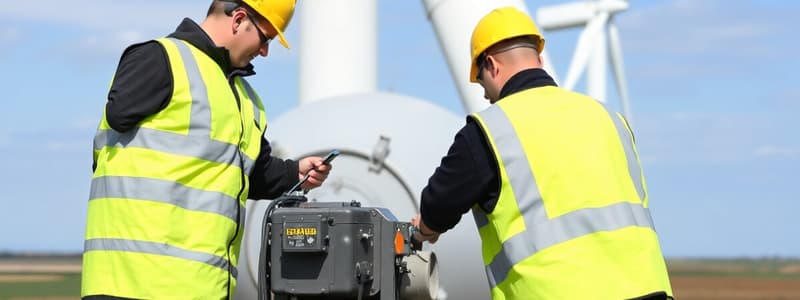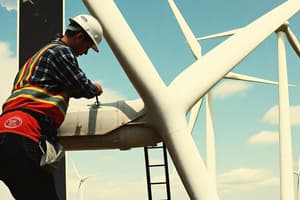Podcast
Questions and Answers
What is the main goal of effective risk management in turbine operations?
What is the main goal of effective risk management in turbine operations?
- To identify equipment faults in advance.
- To ensure faster task completion.
- To anticipate and respond to dynamic risks effectively. (correct)
- To improve turbine efficiency.
What must be confirmed before entering a nacelle?
What must be confirmed before entering a nacelle?
- Wait for team leader approval.
- Confirm all isolation and safety checks are completed. (correct)
- Test the turbine's operational status.
- Start the generator manually.
When should fall protection equipment be replaced?
When should fall protection equipment be replaced?
- When new equipment becomes available.
- As per manufacturer guidelines or after visible wear or damage. (correct)
- Every two years, regardless of use.
- Only after a fall incident.
What is the key reason for conducting regular blade inspections?
What is the key reason for conducting regular blade inspections?
What hazard is significantly increased by high wind speeds during turbine work?
What hazard is significantly increased by high wind speeds during turbine work?
Why are safety drills essential for turbine teams?
Why are safety drills essential for turbine teams?
What is the best method to reduce risks when handling heavy turbine components?
What is the best method to reduce risks when handling heavy turbine components?
What action should be taken if a turbine shows signs of overheating?
What action should be taken if a turbine shows signs of overheating?
What is the key risk of working near moving turbine blades?
What is the key risk of working near moving turbine blades?
Why is grounding important during electrical work?
Why is grounding important during electrical work?
When should lockout/tagout (LOTO) procedures be used?
When should lockout/tagout (LOTO) procedures be used?
What is the first step in a rescue from height?
What is the first step in a rescue from height?
Why is regular calibration of safety equipment critical?
Why is regular calibration of safety equipment critical?
What is the main purpose of fire-resistant clothing in turbine work?
What is the main purpose of fire-resistant clothing in turbine work?
What is the main hazard of hydraulic systems in turbines?
What is the main hazard of hydraulic systems in turbines?
Why is situational awareness important in turbine maintenance?
Why is situational awareness important in turbine maintenance?
Flashcards
Wind turbine blade strike hazard
Wind turbine blade strike hazard
Working near moving turbine blades poses a risk of severe injuries from blade strikes or debris.
Grounding in electrical work
Grounding in electrical work
Grounding is crucial in electrical work to prevent electric shocks and ensure a safe environment.
Lockout/tagout procedures
Lockout/tagout procedures
Lockout/tagout procedures must be used before working on any electrical or mechanical system to prevent accidents.
First step in a height rescue
First step in a height rescue
Signup and view all the flashcards
Safety equipment calibration
Safety equipment calibration
Signup and view all the flashcards
Fire-resistant clothing purpose
Fire-resistant clothing purpose
Signup and view all the flashcards
Hydraulic system hazard
Hydraulic system hazard
Signup and view all the flashcards
Situational awareness in maintenance
Situational awareness in maintenance
Signup and view all the flashcards
Nacelle Entry Precautions
Nacelle Entry Precautions
Signup and view all the flashcards
Fall Protection Equipment Replacement
Fall Protection Equipment Replacement
Signup and view all the flashcards
Turbine Blade Inspection Purpose
Turbine Blade Inspection Purpose
Signup and view all the flashcards
High Wind Risk During Turbine Work
High Wind Risk During Turbine Work
Signup and view all the flashcards
Safety Drill Importance
Safety Drill Importance
Signup and view all the flashcards
Heavy Component Handling
Heavy Component Handling
Signup and view all the flashcards
Turbine Overheating Response
Turbine Overheating Response
Signup and view all the flashcards
Dynamic Risk Management
Dynamic Risk Management
Signup and view all the flashcards
Study Notes
Wind Turbine Safety Questions and Answers
-
Key risk of working near moving turbine blades: Severe injury from blade strikes or debris.
-
Importance of grounding during electrical work: To prevent electric shocks and ensure a safe work environment.
-
When to use lockout/tagout (LOTO) procedures: Before working on any electrical or mechanical system.
-
First step in a rescue from height: Secure the area and communicate with the rescue team.
Why is regular calibration of safety equipment critical?
- Ensure accurate performance and reliability.
What is the main purpose of fire-resistant clothing in turbine work?
- Protect workers from burns caused by electrical arcs or fires.
What is the main hazard of hydraulic systems in turbines?
- High-pressure fluid leaks causing injuries or equipment damage.
Why is situational awareness important in turbine maintenance?
- Anticipate and respond to dynamic risks effectively.
What should you do before entering a nacelle?
- Confirm all isolation and safety checks are completed.
How often should fall protection equipment be replaced?
- As per manufacturer guidelines or after visible wear or damage.
What is the purpose of regular blade inspections?
- Identify and address damage that can affect performance and safety.
What is the critical hazard of high wind speeds during turbine work?
- Increased risk of falls and equipment instability.
Why are safety drills necessary for turbine teams?
- Prepare workers for potential emergencies like falls or fires.
How can you reduce risks when handling heavy turbine components?
- Use proper lifting techniques and mechanical aids.
What should you do if a turbine shows signs of overheating?
- Shut down the system and inspect for faults.
What is the primary goal of wind turbine safety protocols?
- Protect workers and ensure safe, efficient operations.
Studying That Suits You
Use AI to generate personalized quizzes and flashcards to suit your learning preferences.




